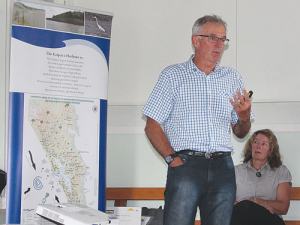“They leach too much nitrogen for the money earned,” he says.
“I need to finish all my stock by the second winter,” he told a Beef + Lamb NZ focus farm field at the White Rock Hills farm on the shores of the Kaipara Harbour.
“As an animal approaches its mature body weight it becomes less efficient in converting the nitrogen it consumes into protein so it starts peeing out more of it.
“I run my business now on a different metric – dollars profit per kilogram of N leached. A breeding cow produces one calf per year; leaching a truckload of nitrogen doesn’t cut it.
“We buy 6-month-old cattle, run them through the year and send them to the works at 14-20 months of age.
“We need hybrid vigour; I can’t get the production gains and the weight gains out of a straight breed so we predominantly use a Charolais-Angus cross.
“I need to grow animals on my farm every day of their lives because if they are just maintaining, sitting on the farm peeing, they are still producing nitrogen but they are not making any money for me.”
They have learned to fertilise in the spring, after October 15.
“All the science on our farm in the last 10 years shows we stop leaching below the root zone after about October 15. That is when plant growth is greater, evapo-transformation is greater and any rainfall from then don’t leach below the root zone,” Barton explained.
“It only affects potassium, sulphur and magnesium – highly leachable elements; phosphorus doesn’t leach. I put all those on in late October rather than autumn. That is a personal choice and one of the learnings from that process.
“We finish a lot of beef in the winter and I feed out a lot of silage. I spend a lot of time sitting on a tractor; this gives me time to think.”
He says they can farm under an emissions cap and are relatively successful. Depending on the season, they are producing 320-350kg of carcase weight per hectare. Their farm surplus is about $1000 a hectare.
“So we can do it. We’ve been under cap six-seven years; my costs have gone up 48% but my income certainly hasn’t gone up 48%. With current beef prices we’ve gone up 20%, but I am still about 25% behind where I was in 2004.
“Under the emissions cap are we going to cap livestock numbers and classes of stock? Or do we need to do something different?
“About 350kg of carcase weight per hectare is about all I can ever expect to do. I can’t grow the quantum of meat; is it possible to grow the value of meat?”
Small and often best
There's good science on leaching and there is a hierarchy with animals, says Barton.
Sheep leach the least, cattle leach the most and dairy cattle leach the most of all cattle.
“But it is not that sheep are more efficient at converting grass into protein,” he says. “It is the way they pee. Sheep urinate a little and often: they might urinate 15 times in 24 hours; young cattle urinate 10-12 times in 24 hours.
“Mature cows urinate four or five times in 24 hours so the need is to aggregate the nitrogen of the larger animals. Deer are between sheep and beef.”

















